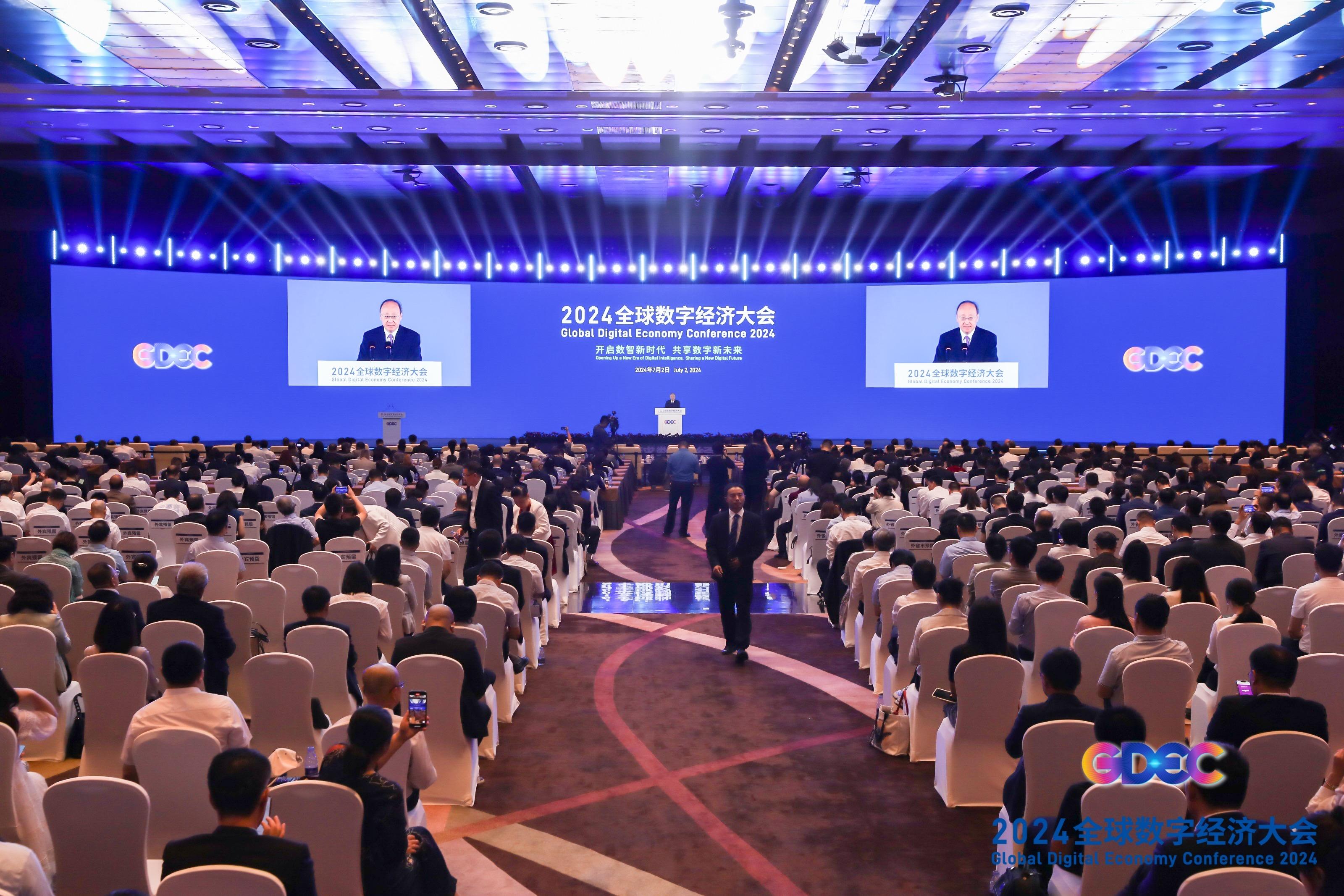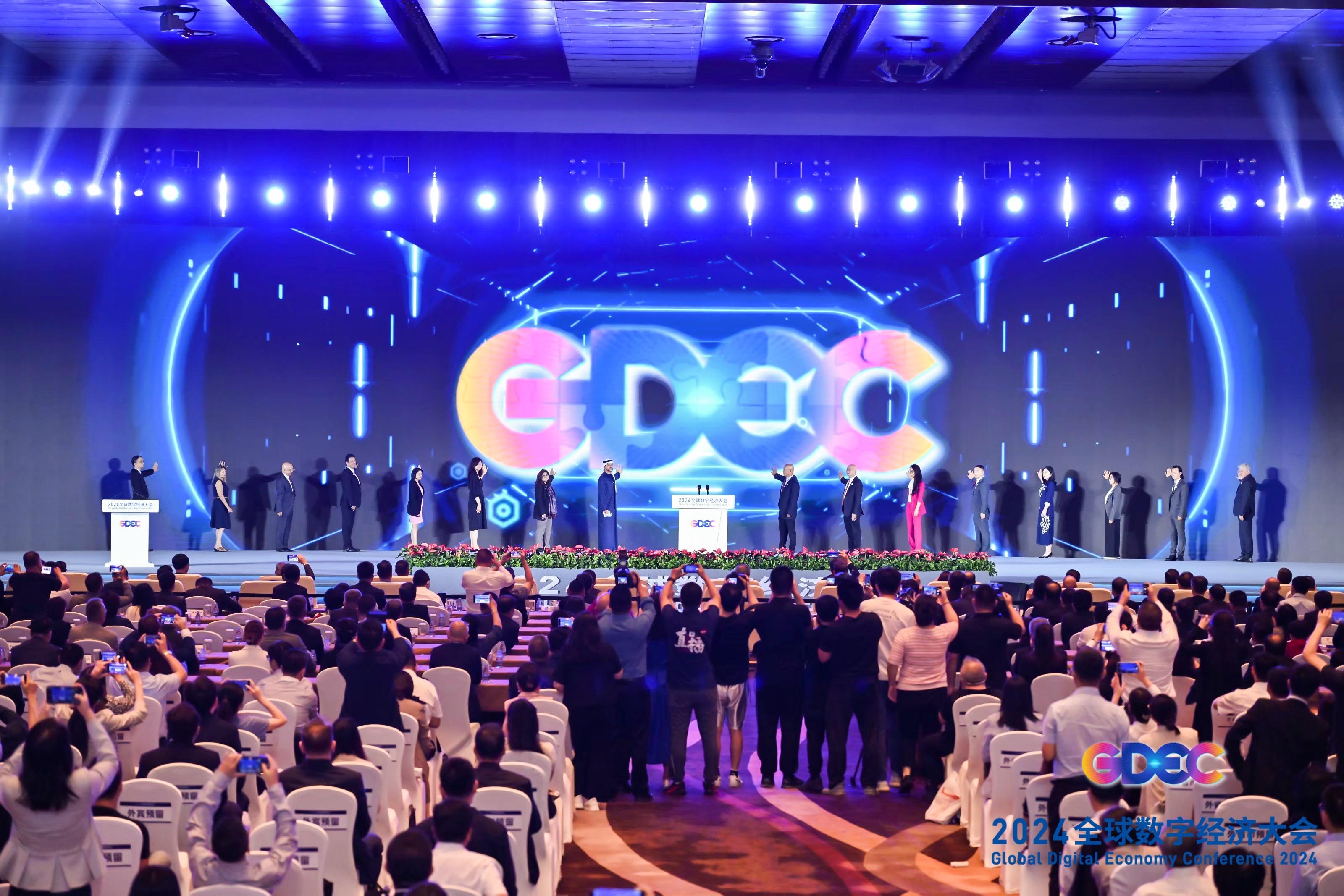
The much-anticipated Global Digital Economy Conference (GDEC) 2024 was unveiled on the morning of July 2 at the China National Convention Center in Beijing. Themed "Opening Up a New Era of Digital Intelligence, Sharing a New Digital Future," the conference focuses on the development trends of the global digital economy and aims at jointly promoting the high-quality development of the digital economy. Yin Li, a member of the Political Bureau of the Communist Party of China (CPC) Central Committee and secretary of the CPC Beijing Municipal Committee, attended the opening ceremony and delivered a speech. Zhuang Rongwen, vice minister of the Publicity Department of the CPC Central Committee, director of the Office of the Central Cyberspace Affairs Commission, and minister of the Cyberspace Administration of China, Liu Liehong, a member of the Leading Party Members' Group of the National Development and Reform Commission (NDRC), and secretary of the Leading Party Members' Group and head of the National Data Administration (NDA), Xin Guobin, a member of the Leading Party Members' Group and vice minister of the Ministry of Industry and Information Technology (MIIT), Shasa Fatima Khwaja, Minister of State for Information Technology and Telecommunication of Pakistan, Sameer Al Ansari, CEO of Digital Asset Oasis in Ras Al Khaimah, UAE, and Stephen Orlins, president of the National Committee on U.S.-China Relations, also addressed the opening ceremony, which was presided over by Yin Yong, deputy secretary of the CPC Beijing Municipal Committee and mayor of Beijing Municipal People's Government. Nearly 1,000 people from both China and beyond, including more than 300 distinguished guests from over 50 countries and international organizations, attended the ceremony.
Zhuang Rongwen, vice minister of the Publicity Department of the CPC Central Committee, director of the Office of the Central Cyberspace Affairs Commission, and minister of the Cyberspace Administration of China, said the Chinese government attaches great importance to the development of the digital economy, seeing it as a crucial element in building a major network country and a digital China, which will benefit not only the Chinese people but also those living in the rest of the world. Zhuang also called for more efforts to continue to enhance the vitality of digital technology innovation, optimize the digital economy, and build Beijing into a model for China's digital economy development and a benchmark for global digital economy development.
Liu Liehong, a member of the Leading Party Members' Group of the National Development and Reform Commission (NDRC), secretary of the Leading Party Members' Group and head of the National Data Administration (NDA), said the in-depth application of digital technologies, represented by the Internet, cloud computing, big data and artificial intelligence, has been generating new models and new business forms and plays an important role in enhancing total factor productivity and creating more jobs, thus bringing new opportunities for economic development. As a pioneer in the development of the digital economy, Beijing boasts advantages in data resources, innovation resources, and industrial development, which provides fertile soil for the development of the digital economy and will make a major contribution to the construction of the digital economy with data as the key element.
Xin Guobin, a member of the Leading Party Members' Group and vice minister of the Ministry of Industry and Information Technology (MIIT), said the MIIT has made in-depth efforts to implement the strategy of building China into a manufacturing powerhouse, the national cyber development strategy, and the digital China strategy to promote the deep integration of digital technology and the real economy. The coordination between digital industrialization and industrial digitalization has achieved positive results. Next, the MIIT will be dedicated to promoting the sustainable and healthy development of the digital economy by following the development trend of digital technology and further advancing the coordination between digital industrialization and industrial digitalization.
Shasa Fatima Khwaja, Pakistan's Minister of State for Information Technology and Telecommunication, mentioned that the China-Pakistan Economic Corridor (CPEC) lays a solid foundation for bilateral cooperation between the two countries. The huge potential of the Chinese IT market offers major opportunities for foreign companies, including Pakistani companies, to expand their business and boost exports. She hopes to blaze a path to digital revitalization by leveraging cooperation between the two countries.
Sameer Al Ansari, CEO of Digital Asset Oasis in Ras Al Khaimah, UAE, pointed out that the trade relationship between China and the United Arab Emirates is expanding rapidly, creating new opportunities for digital cooperation between the two countries. He hopes that entrepreneurs and innovators will join this exciting process and jointly shape the future of blockchain and digital assets.
Stephen Orlins, president of the National Committee on U.S.-China Relations, believed cooperation between China and the United States in the field of artificial intelligence might bring significant benefits not only to the two countries but also to the world, which should and must be the priority of the future open cooperation between China and the United States in the digital economy. It is expected that the cooperation between China and the United States in the digital economy can be extended from the digital era to the digital intelligence era in a steady way.
Yin Li, a member of the Political Bureau of the Communist Party of China (CPC) Central Committee and secretary of the CPC Beijing Municipal Committee, delivered the concluding speech. He said Beijing will continue to uphold the principles of openness, inclusiveness, and progressiveness, strengthen cooperation with first-class scientific research institutions from China and abroad, and intensify the pursuit of breakthroughs in key core technologies. By rolling out supporting measures, Beijing will promote the valorization and capitalization of data elements to achieve win-win outcomes in industrial development and urban construction, providing a "Beijing Solution" for global digital economy governance.

The opening ceremony also released the results of digital cooperation among global cities since the Global Digital Economy Partner City Cooperation Initiative was issued in 2023. This year, the conference will once again expand the "circle of friends" of the global digital economy and continue to promote practical cooperation in the digital field by allowing more cities to join the Initiative and establishing a cooperation network among chambers of commerce and associations. In the meanwhile, Beijing will work with other cities to adopt six action plans to implement the Initiative: the first is to bolster digital infrastructure connectivity; the second is to promote the trial of digital rules and standards; the third is to carry out joint training of digital talents; the fourth is to promote cooperation in pilot/demonstration projects; the fifth is to establish a service center for outbound digital economy enterprises; the sixth is to carry out research on standards of digital economy cities.
The conference will continue until July 5, drawing international and domestic participants for in-depth exchanges to promote common development and jointly advance the high-quality development of the global digital economy.